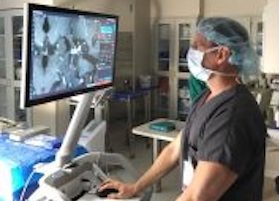
Less invasive Deep Brain Stimulation implant
Neurosurgeon Dr. Anant Patel, who is affiliated with St. David’s North Austin Medical Center, and Neurology Solutions Movement Disorders Center Medical Director Dr. Robert Izor are at the forefront of a less invasive, more precise Deep Brain Stimulation (DBS) implant procedure. The new surgical technique streamlines the process for undergoing DBS surgery—requiring one less procedure and five fewer incisions.
The new DBS implant technique uses the latest imaging and surgical programming equipment and eliminates the need for placement of bone marker screws prior to DBS surgery.




